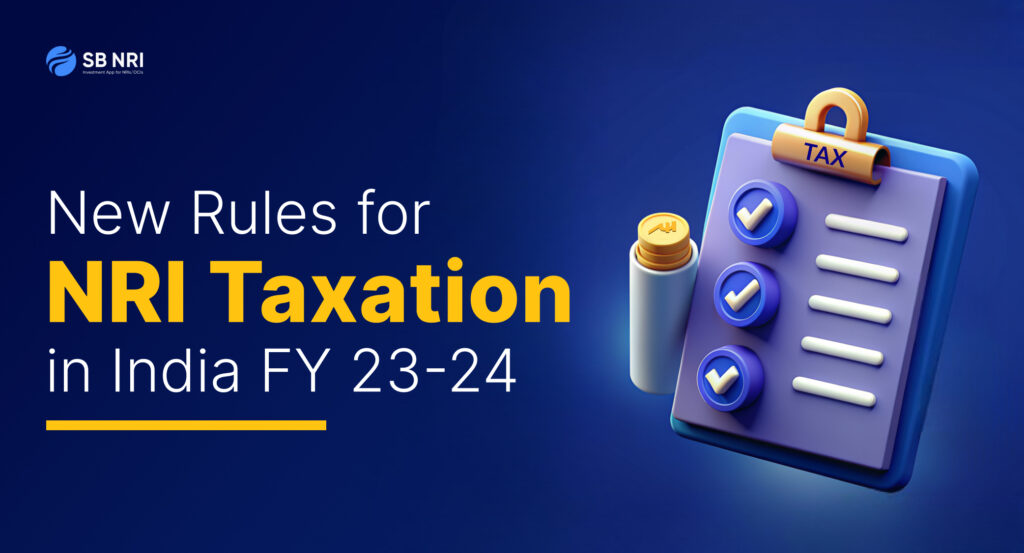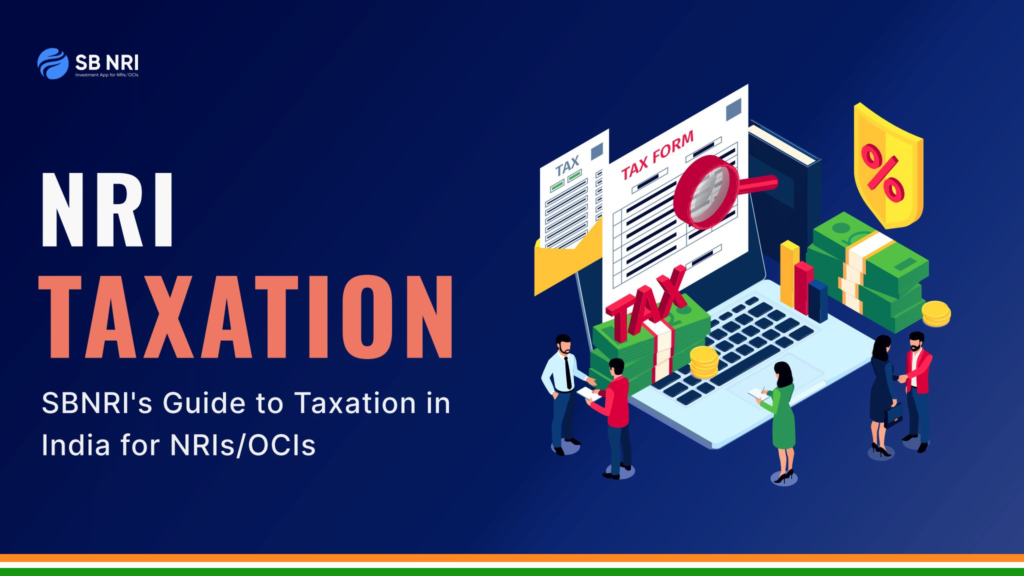
Non-Resident Indians (NRIs) fall under the Income Tax Act, 1961. The income tax rules for NRIs vary greatly from those for residents. The status of an Indian citizen, whether a resident or NRI, is determined based on their physical presence in India during a financial year and the preceding 10 financial years. However, the residential status of an individual needs to be determined each year. Here are the new rules for NRI taxation in India.
Rules that Govern NRI Status
Under the legislation in India, there exist two primary laws that establish and outline the regulations pertaining to Non-Resident Indians (NRIs) as follows:
- Income Tax Act: This law governs the obligations related to taxation for NRIs.
- Foreign Exchange and Management Act (FEMA): This law regulates various aspects such as transactions, investments, the establishment of bank accounts, and more, concerning NRIs.
It is important to note that the definition of NRI differs under each of these acts.
Also read: NRI Income Tax Slab Rates for FY 2023-24 (AY 2024-25)
New Rules to Determine NRI Status
An Indian citizen is considered a resident for a financial year if he/she fulfills any of the basic conditions mentioned below:
- You should be physically present in India for 182 days or more during the relevant financial year. Or
- Your physical presence in India during the applicable financial year is 60 days or more and 365 days or more in the preceding four financial years.
- An Indian citizen having total income, excluding income from foreign sources, exceeding Rs. 15 lakh during the relevant financial year. He should not be liable to pay tax in any other country or territory by reason of his domicile or any other criteria of similar nature.
The condition of 60 days is extended to 182 days if the individual leaves India for employment abroad. For an Indian citizen or a person of Indian Origin (PIO) who resides outside India and visits India, the condition of 60 days is extended to 120 days, if the total income of such a person in India is more than Rs. 15 lakh. However, if the total income (excluding the income from foreign sources) is equal to or less than Rs. 15 lakh, the condition of 60 days is extended to 182 days.
Note: The rule of the deemed residency and 120 days came into effect from the financial year 2020-21.
Any Indian citizen who does not meet the above conditions would qualify as a Non-Resident Indian (NRI).

New Definition of Resident but Not-Ordinarily Resident (RNOR)
Any individual who fulfills the following conditions will be considered as an RNOR for the year:
- You have stayed in India as an NRI for 9 years out of 10 previous years preceding the concerned year, or
- If you have been in India for a maximum of 729 days in the 7 years before the the year of consideration
As per the amendment in the residency provisions made by Finance Act 2020, an Indian citizen/ PIO who comes to visit India will be considered as RNOR provided:
- His/ her total income, other than foreign income, is Rs. 15 lakh or more.
- He/she has stayed in India for above 120 days and less than 182 days in the previous year. Or
- He/she has been in India for 365 days or more in four years preceding the previous year.
Before the mentioned amendment, these individuals were considered as non-residents. As per the amendment, an individual who stays in India for more than 182 days shall be classified as a resident regardless of his/ her income in the previous year.

Deemed Residency Status as per Finance Act 2020
The provision of ‘Deemed residency’ was introduced in the Finance Act 2020. As per the act, Indian citizens whose income is more than Rs. 15 lakh from sources in India shall be deemed a resident of India provided they are not liable to pay taxes in any other country.
He/she shall be classified as RNOR with effect from the FY 2020-21. Hence, Indian citizens who are not liable to pay tax elsewhere are taxed in India after this amendment.
Special Relief in view of Covid-19 Lockdown
Special relief for FY 2019-20 for individual who visited India before 22nd March 2020 and they were:
- Not able to leave India due to lockdown on or before 31st March 2020 – the period of stay ranging from 22nd to 31st March will not be considered.
- Quarantined on account of Covid-19 on or after 31st March 2020 and left the country on evacuation flight on or before 31st March 2020, or couldn’t leave India – the period of stay from running from the beginning of quarantine to 31st March will not be considered.
- Departed on or before 31st March 2020 – the time of stay ranging from 22nd March 2020 to the date of departure shall not be considered.

NRI Taxation: New Rules for NRI in India
If you reside and work abroad, your tax liability as an NRI will depend on your residential status for the year. Residential status of an individual is divided into three categories – Resident and Ordinarily Resident (ROR), Resident but Not Ordinarily Resident (RNOR) and Non-Resident (NR). The scope of taxation in India based on the residential status of an Individual would be as under:
| Particulars | ROR | RNOR | NR |
|---|---|---|---|
| Income received or considered to be received in India | Taxable | Taxable | Taxable |
| Income earned or accrued in India | Taxable | Taxable | Taxable |
| Income that accrues outside India from: – Business controlled in India or profession established in India – Other income | Taxable Taxable | Taxable Nontaxable | Nontaxable Nontaxable |
Types of NRI Income Taxable in India
Note: There are different rules for taxation of different types of income such as sale of unlisted securities, in case of NRIs.
The income tax for NRIs is levied on the following income:
1. Salary received for services provided in India
- Salary or income received by an NRI for the services provided in India shall be taxable, irrespective of the place of receipt. Salary of an Indian citizen paid by the Government of India for the services rendered outside India will be considered as Indian income and taxed even if the status of the individual is Non-Resident.
2. House Property Income
- Rental income from property owned in India by an NRI is taxable in the same manner as the resident.
- Capital gains generated from the sale of a property, rental income, etc. in India are subject to tax.
- NRI can claim a standard deduction of 30% in India. Under Section 80C, NRIs can also claim deductions for principal repayment, registration charges and stamp duty. They can also claim tax deductions up to Rs. 1.5 lakh on interest paid on a home loan during a financial year.
- The tenant who makes rental payments to NRI will be responsible for TDS deduction at 30% under Section 195. He/she will need to fill the form 15CA and submit it online to the income tax department.
Also read: NRI Tax on Rental Income: Rules, Rates and More
3. Capital Gains Income
- Capital gains or income from the sale of listed short-term/ long-term securities, mutual funds are taxable.
- Capital gains on shares held in India are subject to tax.
- Capital assets like house property, securities, shares, gold etc. of Indian origin are taxable in India.
- Capital gains upon the transfer of any capital asset situated in India are taxable.
4. Income from other Sources
- The interest income accrued from fixed deposits and savings bank accounts held by an NRI in Indian bank accounts is taxable in India.
- Interest on an NRO account is fully taxable. Interest earned on NRE and FCNR accounts is tax-free in India.
5. Income from Business and Profession
- Any income earned by NRIs from a business established or controlled in India is taxable to the NRI.
Various Deductions Available to NRIs
Outlined below are the deductions and exemptions applicable to the Income Tax of Non-Resident Indians (NRIs):
Deductions under Section 80C:
Given below are the deductions available to NRIs under Section 80C:
- Tuition fees for children: NRIs can avail a deduction for tuition fees paid to schools, colleges, or universities in India for the full-time education of their children.
- ULIPs (Unit Linked Insurance Plan): Investment in ULIPs provides insurance and investment benefits in a single integrated plan. Premiums paid for oneself, spouse, and children are eligible for deduction.
- Life insurance policy premiums: Deduction is available if the policy is purchased in the NRI’s name, spouse’s name, or child’s name, provided the premium is less than 10% of the sum assured.
- ELSS (Equity Linked Tax Saving Scheme): By investing in ELSS, NRIs can claim a tax rebate of up to Rs 1,50,000 per year, resulting in potential tax savings of up to Rs 46,800 per year.
- Principal repayments on home loans: Similar to Indian residents, NRIs can claim a deduction for the repayment of principal on home loans. Other expenses related to acquiring the property also qualify for deduction under this section.
Section 80D
- NRIs have the opportunity to claim tax deductions on the premiums paid for health insurance policies under this specific section.
Section 80E
- NRIs can avail tax deductions on the interest paid on education loans under this section.
Section 80G
- NRIs can claim tax deductions on payments made in the form of eligible donations under this section.
Section 80TTA
- A deduction of up to Rs. 10,000 can be claimed on the interest income earned from savings bank accounts under this section.
Also read: 5 Tips for NRIs Filing Income Tax Returns in India
Are NRIs Required to File Income Tax Return in India as per New Rules?
Any individual, whether resident or NRI, whose income in India exceeds Rs. 2,50,000 is required to file an income tax return in India. However, a new tax regime was introduced in Union Budget 2023-24 for NRIs. New Rules for NRI Taxation will apply based on their current residential status and relief provided by new Acts.
Also read: ITR Filing for NRIs AY 2024-25: Step-by-Step ITR Filing Process
Calculate your TDS Refund with SBNRI’s TDS Refund Calculator
A TDS refund is the process of reclaiming the excess tax deducted at source by the payer if the actual tax liability of the taxpayer is lower than the TDS deducted. This situation typically arises when the income tax calculated on the total income is less than the TDS already deducted. To claim a TDS refund, taxpayers need to file an income tax return (ITR). The Income Tax Department processes the ITR and verifies the details. If the tax department finds that the TDS paid is more than the actual tax liability, the excess amount is refunded to the taxpayer.
You can easily find out how much tax refund you can get by calculating your TDS Refund from this TDS Refund Calculator.
Access SBNRI’s Exclusive NRI Taxation Guide

NRIs and OCIs can now access SBNRI’s exclusive NRI Taxation Guide covering in-depth information about DTAA, Gift Tax, Rental Income Tax, ITR Filing, Types of ITR Forms for NRIs, Capital Gain Tax, Income Tax, and more. The report will help you understand India taxation on mutual funds, other asset classes and how you can comply with the regulations.
Access NRI Taxation Guide here
Wrapping Up
The new rules for NRI taxation in India for FY 2023-24 emphasize the importance of understanding residential status, income categorization, and compliance requirements. Staying updated with these changes helps NRIs effectively manage their tax obligations and leverage available benefits. Consulting with tax professionals and leveraging digital tools for tax filing can ensure a smooth and compliant financial year.
Looking for NRI ITR Filing? Connect with SBNRI NRI Tax Expert CA Today!

At SBNRI, we have simplified ITR filing for NRIs/OCIs through a smooth digital journey. Be it Basic Filing, Advanced Filing (includes Capital Gain, etc.), or Premium Filing (Foreign Income), we can help you assess the right computation and lower your tax liability.
“We’ve helped over 500+ NRIs/OCIs file ITR returns and more than 25,000+ across other taxation services last financial year and we’d love to help you out too”
You can download SBNRI App or connect with NRI Tax Expert team directly via the button below.
FAQs
Do NRIs need to be present in India to file an ITR?
No, it is not true. NRIs can easily file and validate their income tax returns online from anywhere in the world.
How to save on taxes in India by NRI?
NRIs can save on taxes in India by utilizing several deductions and benefits. They can claim a standard deduction of 30% and deduct property taxes and interest from a home loan.
Should NRIs file tax returns in India?
NRIs should file income tax returns in India if they earned income in India during the financial year. Their tax liability depends on their residential status.
What are 120 days rules for NRIs?
The 120 days rule for NRIs states that if they spend more than 120 days but less than 182 days in India and their total income from India is ₹15 lakh or more, they are considered “resident but not ordinary resident” (RNOR).
How to avoid TDS for NRI?
- One way is by opening a specific bank account like:
- A Non-Resident Ordinary Rupee Account (NRO)
- A Foreign Currency Non-Resident Account (FCNR)
- A Non-Resident External Account (NRE)
What is the rule for NRI in ITR?
If the annual returns for NRIs cross the basic exemption limit of Rs 2.5 lakh, NRIs should file their return. However, there are cases where the NRIs/OCIs need to file their return even if their income is less than Rs 2.5 lakh. Here are those cases:
- If you have deposits or aggregate of more than 1 cr in one or more current accounts
- If you spend more than 2 lacs on foreign travel
- If you spend more than 1 lacs on electricity expenditure
What is the penalty for not declaring NRI status?
There is no penalty for not declaring NRI status. However, we advise you to update your NRI status on the IT portal and also close your resident savings account. This will help you to avoid any discrepancies from the IT department and also help you comply with the regulations.
Do NRIs pay capital gains tax?
Yes, capital gains tax provisions for an NRI are similar to those for a resident individual except for the applicability of TDS provisions. Like resident investors, capital gains tax for an NRI depends on the holding period and the type of property sold.
How long can I maintain NRI status after returning to India?
For RNORs returning to India, they can retain their RNOR status for up to 3 years after their return. During this period, any income earned in India will be taxable, while income earned abroad will not be taxable, similar to the tax treatment for NRIs, for those 3 years post-return.
What is the 4 year rule of NRI?
An individual is considered an NRI under the Income Tax Act if they have been in India for fewer than 182 days in the preceding financial year, or if they have been in India for fewer than 60 days during the previous year and 365 days or less over the past four years.
What is the 182 days rule for NRI?
NRI can stay in India for more than 182 days during a financial year. However, doing so will change their residential status from NRI to resident. In other words, to retain NRI status, an individual must stay in India for fewer than 182 days in a financial year.
What is the 240 days rule for NRI?
The 240 days rule for NRI refers to a provision introduced in the Finance Act 2020. According to this rule, an individual will be considered an NRI if they stay in India for 240 days or less during a financial year, provided they also meet certain other conditions related to previous years’ stays in India. This amendment was made to provide more clarity and flexibility for determining NRI status, ensuring that individuals who spend a significant portion of the year outside India are not taxed as residents.
When is the last date to file an income tax return in India for NRIs?
NRIs need to file income tax returns in India before 31st July without any penalty, unless the government extends the last date.
Is NRI subject to capital gains tax on sale of a flat owned by him/her in India?
Yes. An NRI seller is liable for capital gains tax in India upon the sale of their property. The purchaser needs to deduct taxes on sale consideration. The tax deduction rate for a long-term capital gain is 20% plus applicable surcharge and cess. On a short-term capital asset, tax is deductible at 30% plus applicable surcharge and cess. However, there is a provision under the law wherein you can apply for a lower TDS certificate.
Can NRIs continue to use their resident savings account?
As per the regulations of the Foreign Exchange Management Act (FEMA), it is prohibited for non-residents to maintain resident savings accounts in India. Therefore, it is necessary to convert your resident savings account into an NRO (Non-Resident Ordinary) account. Failure to comply with this requirement and continuing to use the resident account may result in significant penalties being imposed.
How can NRIs benefit from Double Tax Avoidance Agreement (DTAA)?
NRIs have two avenues to benefit from double taxation relief, as outlined below:
- Tax Credit Method: In the Tax Credit Method, the home country allows the NRI to claim a tax credit for the tax paid in the source country where the income is earned.
- Tax Exemption Method: In the Tax Exemption Method, the income is taxed in one country and exempted from taxation in another country.
Do NRIs need to be present in India to file an ITR?
No, it is not true. NRIs can easily file and validate their income tax returns online from anywhere in the world.
Do NRIs need to pay advance tax?
If their tax liability exceeds Rs. 10,000 in a financial year, NRIs have to pay advance tax. Under Section 234B and Section 234C, interest will be applicable if you don’t pay your advance tax.
Is there any income tax for NRI in India?
An NRI’s income which is earned or accrued in India is taxable in India. The income earned outside India by an NRI is not taxable in India. Interest earned on NRE and FCNR savings and fixed deposit accounts is tax-free in India. However, interest earned on an NRO account is taxable.
What is the income tax rate for NRIs?
NRI income tax rates are mentioned in the first table in this blog along with the NRI income tax slabs.
When should an NRI file an income tax return in India?
Like resident taxpayers, an NRI must file his/her return of income in India if his/ her Indian income exceeds Rs. 2.5 lakh for the financial year. The last date for income tax filing for NRIs is 31st July of the assessment year.
Is an NRI subject to capital gains tax if he sells his house property in India?
Yes, an NRI will be liable to pay capital gains tax in India upon the sale of his flat. The buyer must deduct taxes on the quantum of gains made by an NRI. The tax deduction rate for a long-term asset would be 20%.
Can NRI claim TDS refund?
If an NRI files Income Tax Return (ITR) after the termination of the financial year in India, they can claim on the deducted TDS. NRI will need to compute his/ her income and tax liability as per the existing slab rates to claim a refund on the TDS.
Is TDS applicable to NRIs?
Interest earned on NRE and FCNR accounts is tax-free in India. Hence there is no TDS. However, interest earned on an NRO account is taxable and will be subject to a TDS of 30%. Other incomes like capital gains, fees for professional services, rental income, etc. may also be liable to TDS.
How can NRI avoid TDS?
An NRI can reduce the TDS liability on sale of his/ her property. The NRI needs to file an application in Form 13 with the Income Tax Department for issuance of certificate for lower or Nil deduction of TDS.
Can NRI claim deductions under Section 24?
NRIs can get tax deductions if they have some taxable income in India. They can claim deductions on the repayment of principal and interest components from the taxable income u/s 24, 80C and 80EE of the Income Tax Act.
Is new tax regime applicable to NRIs?
Yes new tax regime is applicable to NRIs. The new tax regime allows the basic exemption to Rs. 3,00,000. However, NRIs can’t claim the rebate on full tax for income up to Rs. 7 lakh.
What is the 80C limit for 2023-24 for NRIs?
Section 80C enables NRIs to lower their taxable income by a maximum deduction of ₹ 1.5 lakh. This deduction can be achieved by making tax-saving investments, such as paying life insurance premiums, expenses like school tuition fees. However, if NRI taxpayers choose the new tax regime, they are not permitted to claim this deduction.



